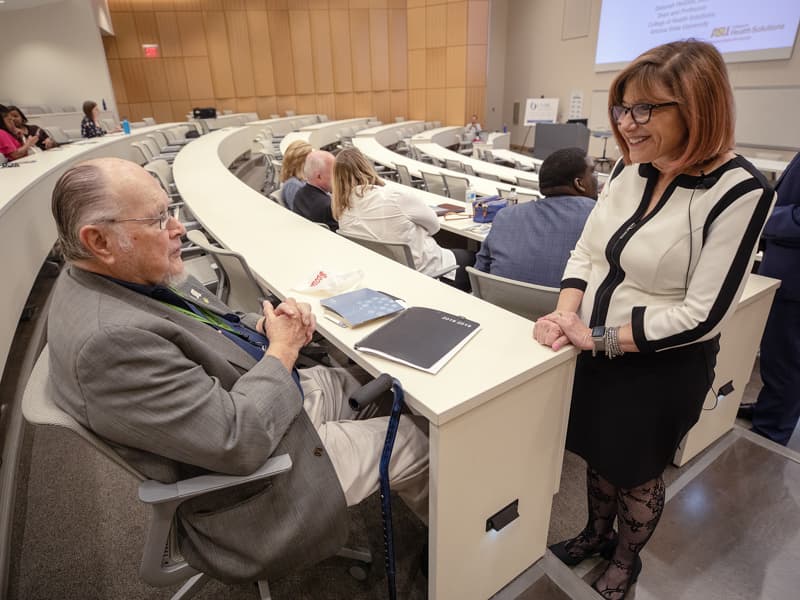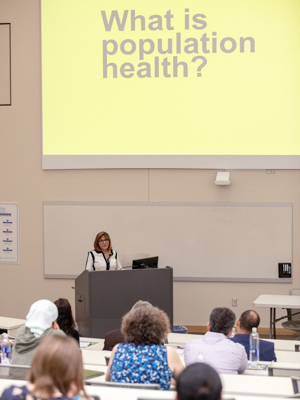Population Health lecture addresses sickness, wellness in U.S.

What is population health? Why are we sick? How do we get well?
Those are the questions Dr. Deborah Helitzer asked and answered at the John D. Bower School of Population Health’s third annual Distinguished Population Health Lectureship, held April 5 at the University of Mississippi Medical Center.
Prior to becoming dean of the College of Health Solutions at Arizona State University, Helitzer was founding dean of the College of Population Health at the University of New Mexico, the second school of its kind in the United States. UMMC’s School of Population Health was the third.

“We are pleased to have Dr. Helitzer with us for this year’s lecture,” Beech said. “Her experience in health outcomes research and in building a school of population health from the ground-up make her insight extremely valuable as we strive to improve the health of Mississippians,” Beech said.
The first question is one that Helitzer gets regularly, she said.
“Population health as an umbrella over the continuum of health, including wellness and prevention,” she said.
Why is population health important, particularly in the United States? Because even though Americans spend more than any other nation on health care – $3.7 trillion a year – we have worse health outcomes than most developed nations. According to a Gallup poll, Helitzer said Americans identify “cost as the most urgent health problem facing this country at the present time.”
When patients cannot pay they may skip on prescriptions or preventive visits, Helitzer said, which can lead to more expensive interventions.
“Routine dental care is most likely to be missed by patients,” Helitzer said. “but dental problems account for hundreds of thousands of emergency room visits.”

Helitzer’s research has focused on health outcome improvements through interventions in communities and in clinical settings. While at UNM, Helitzer led the development and implementation of the nation's first undergraduate degree in population health.
Only about 10 percent of health is determined by genes and biology, and another 10 percent by the clinical care a person receives, Helitzer said. The remaining 80 percent comes down to the social determinants of health, which include personal behaviors, social cohesion, economics and geography.
“What’s frightening is that top contributors to health problems are things that doctors cannot fix, and the care that they give can be undermined by the social determinants of health,” she said.
For example, an analysis of the 739 deaths following the Chicago heat wave of 1995 found that the strongest risk factor for death was social isolation. Those who died were more likely to be homebound or to live alone.
Likewise, the health of a population doesn’t improve without a cohesive effort. Can changes to the non-medical systems in the community positively affect a population’s health? Yes, Helitzer said. She pointed to examples like the “Light Rail Diet,” where researchers found an 80 percent reduction in obesity risk for Charlotte, North Carolina neighborhoods after the construction of the city’s new transit system.
In preparation her visit to Mississippi, Helitzer learned about the Defeat Diabetes Mississippi Moonshot, the School of Population Health’s community-based program to reduce the state’s high burden of type 2 diabetes.
“In population health, we need to understand how difficult behavioral changes can be when up against some of the social determinants of health, Helitzer said. “It’s important that we be more intentional in the way we train health care providers to be more aware of the struggles their patients may face.”

